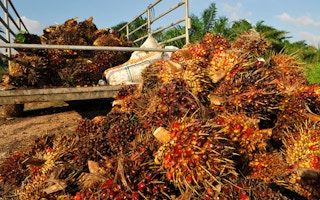Green groups are pressuring PepsiCo to stop letting joint venture partners such as Indonesia’s biggest food company use its brand for products made with so-called conflict palm oil.
The Rainforest Action Network says the inadequate scope of PepsiCo’s new pledge to eliminate deforestation, peatlands conversion and rights abuses from its palm oil supply chain constitutes a “loophole the size of Indonesia.” The Southeast Asian country is the world’s largest palm oil producer.
Taren Stinebrickner-Kauffman, executive director of SumOfUs.org, an international consumer watchdog organization which has gathered hundreds of thousands of signatures against PepsiCo’s palm oil commitment, said the policy “falls far short.”
“This isn’t the first time that PepsiCo customers have forced the food giant to amend its palm oil policy,” Stinebrickner-Kauffman said in a statement, “but each time, PepsiCo fails to address the fundamental problems of rainforest destruction and the fact that workers across Southeast Asia, including children, are trapped in modern slavery in the production of palm oil.”
The latest version of PepsiCo’s policy makes no mention of joint venture partners. It only mentions “direct suppliers” of palm oil and says the commitment applies to them.
According to RAN, PepsiCo asserted in discussions with the NGO that “it was not willing to state that its JVPs are required to comply with its policy,” Gemma Tillack, RAN’s head agribusiness campaigner, wrote in an email.
“It is vital that PepsiCo’s palm oil commitment applies to all suppliers providing palm oil that is used to make PepsiCo branded products sold globally, not just the products made in PepsiCo’s own facilities,” Tillack said.
Asked if the policy applies to Indofood, PepsiCo spokeswoman Aurora Gonzalez acknowledged via email “limitations, including legal ones,” around joint ventures, and added that PepsiCo has “engaged” Indofood and is “discussing the need to take further action.”
Asked subsequently whether that means PepsiCo is not legally able to require Indofood to use deforestation-free palm oil for PepsiCo branded products, Gonzalez did not respond. Nor did she answer a question of whether PepsiCo going forward would license out its brand to a company that hasn’t committed to using deforestation-free palm oil going forward.
“PepsiCo makes commitments and establishes policies based on understanding the issue, identifying realistic solutions and the ability to execute against an action plan,” she said in her only email.
Indofood’s PT PP London Sumatra Tbk is one of Indonesia’s biggest oil palm plantation developers. The parent company is owned by the Salim Group and is one of the palm oil industry’s largest companies yet to promise to refrain from deforestation and peatlands conversion, whose widespread occurrence is fueling the ongoing wildfire and haze disasters in Sumatra and Borneo.
Franky Welirang, a senior representative of the Indofood team, did not respond to a request for comment.
As part of the campaign, RAN and Rainforest Foundation Norway commissioned a sustainability assessment of Indofood’s palm oil operations. The report was conducted by Aidenvironment and chronicles numerous land conflicts with Indonesian communities and acts of environmental destruction the company has been involved in.
“Our documentation in the sustainability assessment report documents that Indofood have been involved in serious environmental damage, so their practice should qualify for divestment” from Norway’s global pension fund, said Nils Hermann Ranum, head of policy and campaigns at Rainforest Foundation Norway.
“Indofood should read the writing on the wall,” he added.










